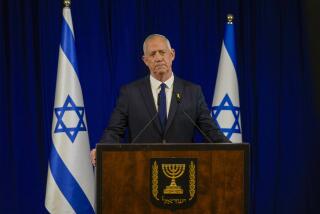Pressured by the Military, Turkish Premier Resigns
- Share via
ANKARA, Turkey — Prime Minister Necmettin Erbakan resigned Wednesday, capitulating to military leaders who had accused his Islamist-led government of pushing Turkey toward fundamentalism and who had threatened to oust him by force.
But the outcome of the military’s struggle against political Islam in this NATO-member nation was far from clear, as Erbakan clung to hope of keeping his 11-month-old coalition government in power under the leadership of a secularist ally.
President Suleyman Demirel, who accepted Erbakan’s resignation, has constitutional authority to ask anyone to form a new government. He gave no assurance that he would accept Erbakan’s proposal to give that task to his coalition partner, Foreign Minister Tansu Ciller, a former prime minister.
The president said he will choose a new prime minister quickly after consulting with political leaders today.
Erbakan’s stormy tenure as modern Turkey’s first Islamist leader was marked by bloodless skirmishes with powerful generals that have paralyzed the government for months.
The military, constitutional protector of the country’s official secular ideology since the 1920s, warned last week that it was ready to crush Islamic radicalism by force.
Moving to avoid Turkey’s fourth military coup since 1960, the 70-year-old prime minister agreed to go.
“I resigned because I am a true patriot,” he told reporters. “Our country will now be freed of a false agenda and useless, needless tensions.
“I am guaranteeing the future of the country by coming up with an alternative government,” he added.
Under his plan, outlined in a letter that Erbakan handed to the president, Ciller, leader of the secularist True Path Party, would lead the government and call elections in October, three years ahead of schedule.
The obscure, ultranationalist Grand Unity Party would join the coalition with True Path and Erbakan’s pro-Islamic Welfare Party, giving it a majority of 282 deputies in the 550-seat Parliament, Erbakan said.
In addition, the plan calls for Erbakan’s own party to keep its Cabinet posts--including the justice, agriculture, finance, labor, culture and energy ministries. That would enable it to dispense patronage in the run-up to elections.
Welfare finished first in the last elections--in December 1995--with 21% of the vote.
Erbakan predicted confidently this week that the party could raise its vote total from 6 million then to 10 million now--an outcome that would make it more difficult to keep the Islamists from power.
The generals have accused Erbakan’s coalition of betraying the secularist vision of Kemal Ataturk, who abolished the Islamic caliphate and founded modern Turkey after World War I.
The crisis began to unfold in February when senior officers on the military-dominated National Security Council handed Erbakan a list of demands aimed at curbing Islamic radicalism.
Erbakan’s efforts to forge closer ties with pariah states such as Libya, Nigeria and Iran also upset the generals.
After pledging to implement most of the military’s demands, Erbakan proved reluctant to do so.
In recent weeks, senior military officers stepped up their pressure through a series of highly publicized briefings for prosecutors, business people, teachers and journalists on what one general called the “life or death” confrontation between secular and religious forces.
Many Turks have welcomed the military’s intervention, fearful that Turkey could become a theocratic state like Iran. But by defying the generals, Erbakan succeeded in portraying himself to his growing party’s grass-roots supporters as the first modern Turkish leader to challenge the military’s unquestioned authority.
More to Read
Sign up for Essential California
The most important California stories and recommendations in your inbox every morning.
You may occasionally receive promotional content from the Los Angeles Times.










